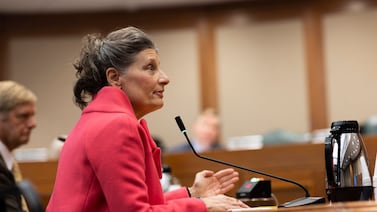Votebeat is a nonprofit news organization reporting on voting access and election administration across the U.S. Sign up for Votebeat Arizona’s free newsletter here.
Update, May 21, 2025: At their May 21 meeting, supervisors moved the vote on this contract to June 29.
Maricopa County supervisors are poised to award a national consulting firm a $400,000 contract for another review of the county’s often-scrutinized election procedures.
County procurement staff is recommending that the supervisors vote Wednesday to award the contract to BerryDunn, an accounting and consulting firm that has examined Maricopa’s election procedures in the past. The yearlong review will cover six main processes, but won’t include a look at past election results.
Supervisors Chairman Thomas Galvin has repeatedly made a point to differentiate this review from the controversial “audit” of Maricopa County’s 2020 election results commissioned by top Republicans in the state Senate. “There will be no Cyber Ninjas here,” Galvin said in January, referring to the company Republican leaders hired for that review, adding, “We are going to look at reputable companies.”
Six other companies also bid for the contract, according to a county spokesperson.
The Republican-led board announced in January that they wanted a contractor to examine how the giant county could improve the way it runs elections for its 2.6 million voters. New supervisors who ran on a platform of “election integrity” said that after years of scrutiny and unproven theories about widespread fraud, they wanted to assure themselves that the county was running secure and efficient elections.
Galvin stressed at the time that he wanted to hire a contractor “who actually has expertise in the field.” He didn’t immediately respond to a request for comment on why BerryDunn was chosen.
BerryDunn has done election consulting work for Maricopa before, in 2018 and 2021, although it appears most of its government contracting work doesn’t involve elections.
BerryDunn conducted an audit of Adrian Fontes’ Election Day procedures in 2018, when Fontes was Maricopa County recorder, after technical issues setting up polling places that year caused many locations to open late. In 2021, it reviewed the county’s procurement process for selecting Dominion Voting Systems. In both instances, it recommended procedures to improve the systems.
The supervisors want the new review focused on six areas: chain of custody for ballots and other supplies and documents, physical security, candidate filing compliance, temporary-worker hiring and training, ballot drop boxes, and vote-center selection and setup.
This will include a review of processes that have come under criticism over the last few elections, including the tracking procedures for the county’s paper ballots, background checks for temporary workers, and ballot pick-up, auditing, and tamper prevention at the county’s drop boxes.
Jen Fifield is a reporter for Votebeat based in Arizona. Contact Jen at jfifield@votebeat.org.



